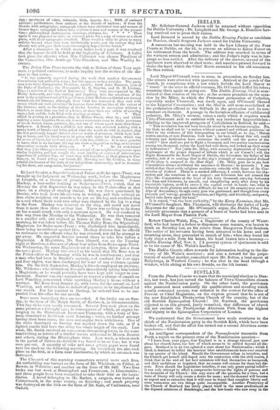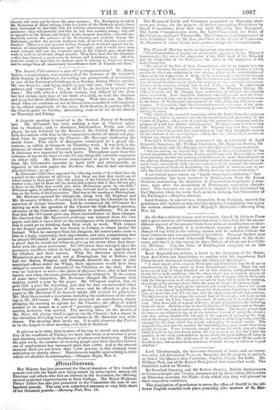SCOTLAND.
From the Dundee Courier we learn that the municipal election in Dun- dee, last week, has just turned the balance of Town-Councillors chosen against the Nonintrusion party. On the other hand, the gentleman who possessed most eminently the qualifications and standing which usually command success, was defeated in the contest for the office of Provost or Chief Magistrate, on the express ground that he is not of the now Established Presbyterian Church of the country, but of the old Scottish Episcopalian Church ! Mr. Sturrock, the gentleman objected to on this ground, justly remarked, that difference of church did not exclude the Presbyterian Alderman Pirie from the highest civil dignity in the Episcopalian Corporation of London.
We understand that the Government have made overtures to the chiefs of the Nonintrusion party in the Scottish Kirk, which have been broken off, and that the affair has turned out a second Aberdeen corre- spondence.— Globe.
An intelligent correspondent of the Nonconformist transmits from Perth a report on the present state of the Nonintrusion question- " I learn from your paper, that England is in a strange turmoil just now about her church-rates, the fate of which seems to be settled beyond all dis- pute. Scotland is in no less agitated a state about her Nonintrusion ; which I think is destined to inflict the heaviest blow establishments have ever received in our quartet of the island. Should the Government refuse to interfere, and the Church get herself still duped into the contention with the civil courts, I think that in the end all her best ministers will find themselves so hampered, and their usefulness so impaired, that no course will remain for them but dis- sent. Even should the Legislature interfere, it can only grant partial relief— it can only attempt to effect a compromise between the rights of patrons and the demands of the Church: this may stave off the question for a time, but a taste of liberty will only create a desire for more; and the demand will become so urgent and so extensive that it will soon be found that complete liberty and state connexion are two things quite incompatible. Another Presbytery of the Church of Scotland has lately placed itself in the same predicament as the deposed ministers of Strathbogie, and the hot-heads who now sway in the Church will mete out for them the same measure. The Presbytery to which Mr. Robertson of Ellon belongs, (who is a leader of the Moderate party,) have been instructed to deal with him for holding communion with the deposed ministers ; they will probably find that he has done nothing wrong ; this will be appealed to the Synod, and from it to the General Assembly ; who will un- doubtedly reverse the sentence of the Presbytery, and probably depose Mr. Robertson ; so that the present confused state of parties becomes more con- founded. There is a very general feeling throughout Scotland against the in- trusion of unacceptable ministers upon the people; and it would have been much stronger had not the dominant party in the Church gone about their work in such an intolerant, illegal manner. They have been like the Chartists —they have injured a good cause by furious and headstrong zeal. All this, however, tends to show that the human mind is striving to burst its fetters, and to escape from all unnecessary incumbrances both in Church and State."
The Scotish Pilot narrates a case of " gross persecution." Mr. Henry Butter, a confectioner, was summoned at the instance of Mr. Guthrie's Kirk-Session, in Edinburgh, for selling one pennyworth of sweetmeats to one of the Sessional schoolboys, on a Sunday, during Divine service. He was fined 8s. ; and being unable to pay that sum, with "fees," two guineas, and "expenses," 118., in all 31. ls., he has lain in prison ever since I His wife, who is a delicate woman, was obliged to rise from her bed within eight days of the birth of a child, to tend the business and keep her three children from starving. With this case, the Edin- burgh Observer contrasts an act of desecration committed with impunity by an official, apparently of the same Kirk-Session, in posting hills at the church-gates on Sunday, advertising seats to be let in the church on Thursday and Friday.
A singular meeting is reported in the Scottish Patriot of Saturday last. Mr. O'Connor has been making a tour of Chartist agita- tion in Scotland ; and to Aberdeen, Dunfermline, Perth, and other places, he was followed by the Reverend Mr. Patrick Brewster, who held discussions with him on the comparative merits of moral and phy- sical force in supporting the Charter—Mr. Brewster vindicating the moral force. This circle of discussion terminated in a grand dis- cussion, so called, at Glasgow, on Thursday week. It was held in the presence of about three thousand persons, in the hall of the Bazaar. A chairman was appointed by each party. Throughout more than five columns of report we hunt in vain for any thing like tolerable argument on either side. Mr. Brewster endeavoured to prove by quotations from Mr. O'Connor's speeches in April 1838 and subsequently, as reported in his own paper, the Northern Star, that he had advocated physical force: ex. gr.-
In November 1838, there appeared the following words—"Let them then fix a period to the existence of suffering. Let them say that they would use all moral means in their power (for the gaining of the Charter) until 29th Sep- tember next ; and let them tell the moral philosophers that if they did not give it them on the 29th, they would give them Michaelmas goose on the 30th." O'Connor again, in reference to fixing a day, bad said that be would put a mo- tion on the books of the Convention. This was at the meeting at Birmingham.
Mr. Brewster accused his antagonist, along with Mr. Stephens and Mr. Bronterre O'Brien, of causing division among the Chartists by this assertion of violent intentions. And he condemned Mr. O'Connor for mixing up with the question of the Charter the Irish Repeal question, advocacy of the Corn-laws, and opposition to machinery. We do not find that Mr. O'Connor gave any direct contradiction to these charges. He observed that Mr. Brewster's evidence was adduced from his own paper, and that it was a libel on the intelligence of its readers to suppose that it could go on deluding them from week to week. With respect to the Repeal question, he was bound, in Ireland, to obtain justice for Ireland. When he emerged from his dungeon, his countrymen came to him in a body, expressing their approbation, and only complaining that he abused O'Connell : he promised never to mention his name again,— a proof that he would not refuse to give up his errors when they inter- fered with the great movement. Mr. O'Connor then enlarged upon the pecuniary sacrifices which he had made, his exertions in agitating for the Charter, and their success. What Mr. Brewster quoted about Michaelmas goose was said, not at Birmingham, but at Bolton ; and had not Muntz, Douglas, and Edmonds deserted the cause to take municipal offices under the Whigs, their oppressors would have been obliged to concede the demands of the Chartists on the 30th. But it was too bad now to revive the ghost of physical force, after it had been buried, and when the cause proceeded merrily without it. In the course of some more discussion, Mr. Brewster charged Mr. O'Connor with making 4,0001. a year by his paper. Mr. O'Connor replied, that he paid 7001. a year for reporting, and that he had recommended other local Chartist papers in place of his own ; and he offered to give the paper to Mr. Brewster if he himself might still control its principles. Mr. Moir then moved a resolution declaring the confidence of the meet- ing in Mr. O'Connor. Mr. Brewster proposed an amendment, simply pledging the meeting to agitate for the Charter; the effect of which seemed to be meant as a sort of " previous question." The original motion, however, was carried. The meeting then, on the motion of Mr. Moir, did pledge itself to agitate for the Charter ; but a clause in the resolution declaring want of confidence in Mr. Brewster was with- drawn. The meeting then broke up. It is said, observes the Patriot, to be the largest in-door meeting ever held in Scotland.
It grieves us to state, that in place of having to record any ameliora- tion of the condition of Paisley, we have this week to announce a great and alarming increase in the amount of misery and destitution. During the past week, the number of working people and their families thrown out of employment has increased more than 1,000; and at the present moment there are not fewer than 7,708 persons in this unhappy town subsisting on charity alouel Matters seem rapidly approaching a crisis which we shudder to contemplate.—Glasgow Argus, Nov. 8.



























 Previous page
Previous page